| Srl | Item |
| 1 |
ID:
114054
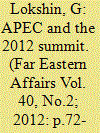

|
|
|
|
|
| Publication |
2012.
|
| Summary/Abstract |
The twentieth summit of the Asia-Pacific Economic Cooperation (APEC) is to be held on Vladivostok's Russky Island on September 8-9. 2012. The technical problems of preparing for the summit, covered in detail in the Russian media, all but eclipsed the basic content of the upcoming forum in the eyes of the public: the actual state of affairs in APEC; its opportunities, challenges, and outlook; and the benefits that might accrue to Russia if she follows the right policy.
|
|
|
|
|
|
|
|
|
|
|
|
|
|
|
|
| 2 |
ID:
130636
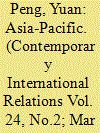

|
|
|
|
|
| Publication |
2014.
|
| Summary/Abstract |
The ability to build a new model of major-nation relations will hinge upon the long-term
peaceful cooperation between China and the United States. The author proposes a
roadmap to solve five problematic issues. All of these are essential for China and the U.S.
to co-exist peacefully and cooperate well in the Asia-Pacific region.
|
|
|
|
|
|
|
|
|
|
|
|
|
|
|
|
| 3 |
ID:
138926
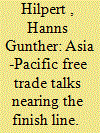

|
|
|
|
|
| Summary/Abstract |
Asia is not only the world’s most dynamic region in terms of trade, it is also an important pacesetter in trade policy. The USA is currently negotiating with 11 partner countries over a Trans-Pacific Partnership (TPP); the members of the ASEAN+6 group are in talks over a Regional Comprehensive Economic Partnership (RCEP), while Japan, China and Korea are conducting trilateral trade negotiations (China-Japan-Korea Free Trade Agreement (CJK FTA)). The multilateral structures emerging from all these initiatives could, in the long term, be combined into a Free Trade Area of the Asia-Pacific (FTAAP). What are the motives behind these agreements? What are their chances of being implemented? When it comes to the trade and geopolitical power struggle that encompasses these talks, does the USA or China have the upper hand? And what role remains for Europe’s trade policy?
|
|
|
|
|
|
|
|
|
|
|
|
|
|
|
|
| 4 |
ID:
115193
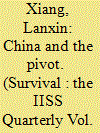

|
|
|
|
|
| Publication |
2012.
|
| Summary/Abstract |
The Obama administration seems to have toned down its rhetoric on Asia-Pacific security, abandoning the fancy but problematic phrase 'pivot towards Asia' and replacing it with the more prosaic 'rebalancing'. This does not mean the content of US policy is very different. On the contrary, the Obama administration continues its military build-up in the region, aiming at a military posture that can only be described as 'absolute superiority'. Over the past two years, Washington has put together a comprehensive 'containment' package in Asia that includes a new military doctrine of air-sea battle; launched a game-changing economic project called the Trans-Pacific Partnership; initiated the 'rotation' of US marines in Australia; and stationed coastal battleships in Singapore. More alarmingly, the United States is making clear attempts to re-establish a naval presence in Subic Bay in the Philippines, and in the coveted Cam Ranh Bay in Vietnam. Both were key US naval bases during the Cold War.
|
|
|
|
|
|
|
|
|
|
|
|
|
|
|
|
| 5 |
ID:
126403


|
|
|
| 6 |
ID:
126860
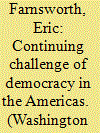

|
|
|
| 7 |
ID:
112623
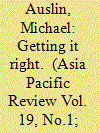

|
|
|
|
|
| Publication |
2012.
|
| Summary/Abstract |
This paper explores the opportunities presented by the Trans-Pacific Partnership (TPP) to Japan to revitalize its trade policy, bolster economic growth, and increase participation in regional multilateral fora for the 21st century. Despite its strengths, Japan has continued to face problems caused by its economic, political, and strategic policies. The Japanese economy has been stagnant for the last several decades, and Japan needs to take bold steps to ameliorate this situation. Politically, domestic political paralysis has had a negative impact on Japan's alliances and partnerships and eroded Tokyo's ability to act as a major player in the increasing vital and important Indo-Pacific region. Connected to this, it is imperative for Japan to engage itself deeply in Asia in ways that increase strategic trust. This paper will also highlight the necessary reforms Japan must undertake to take full advantage of the benefits of the TPP, as well as what the TPP might mean for its relationship with both the US and other regional partners.
|
|
|
|
|
|
|
|
|
|
|
|
|
|
|
|
| 8 |
ID:
120515
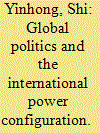

|
|
|
| 9 |
ID:
117180
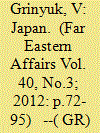

|
|
|
| 10 |
ID:
119099
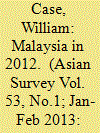

|
|
|
|
|
| Publication |
2013.
|
| Summary/Abstract |
During 2012, Malaysia's Prime Minister Najib Razak undertook a number of political and economic reforms. At the same time, his rival, former Deputy Prime Minister Anwar Ibrahim, was found not guilty of sexual misconduct charges. However, major corruption scandals continued to break. And a large scale protest over electoral cheating turned violent. Meanwhile, the economy remained on an even keel, while the government negotiated with the U.S. over entry into the Trans-Pacific Partnership.
|
|
|
|
|
|
|
|
|
|
|
|
|
|
|
|
| 11 |
ID:
123988
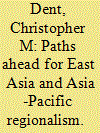

|
|
|
|
|
| Publication |
2013.
|
| Summary/Abstract |
East Asia and the Asia-Pacific are core components of the global economy, and there have been important recent developments in the regionalism of both regions. After the 1997-1998 financial crisis, East Asian countries initiated more exclusive regional cooperation and integration ventures mainly through ASEAN Plus Three, but lately this process has stumbled. The Asia-Pacific Economic Cooperation (APEC) forum has also failed to make substantial progress.
Attention has instead increasingly turned to free trade agreements (FTAs), yet these have hitherto been overwhelmingly bilateral in nature. There are still only a few truly regional FTAs in East Asia and the Asia-Pacific - and these are on a sub-regional scale. However, various frustrations over the messy and fractious pattern of heterogeneous bilateral agreements led to the recent initiation of 'grand regional' FTA talks.
The Trans-Pacific Partnership (TPP) is an Asia-Pacific-based, United States-led project while the Regional Comprehensive Economic Partnership (RCEP) is an East Asia-centred project. Each contains highly diverse memberships and the successful conclusion of TPP and RCEP talks is not assured.
It is argued that, if negotiated, the RCEP is more likely to advance meaningful and effective regionalism than the TPP due to the former ascribing more importance to regional community-building. Furthermore, bilateral FTAs already in force may over the long term transform into more comprehensive economic agreements that address new regional and global challenges such as energy security and climate change.
|
|
|
|
|
|
|
|
|
|
|
|
|
|
|
|
| 12 |
ID:
129622


|
|
|
| 13 |
ID:
124180
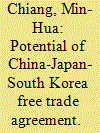

|
|
|
|
|
| Publication |
2013.
|
| Summary/Abstract |
This article explores the economic calculations behind the recent initiatives for the Free Trade Agreement (FTA) between the Governments of China, Japan and South Korea (CJK) and clarifies the implications for future regional economic integration. First, the proposed trilateral FTA signifies an advancement of China-centered regional economic integration. Regional economic integration led by China may also increase its political clout at the global stage. Second, the Governments of South Korea and Japan seek greater involvement in China's huge domestic market, but the former is concerned that a trilateral FTA will worsen its trade deficit with Japan, and the latter is afraid of losing its market shares in China and America to its Korean rival. Japan, therefore, seeks membership of both the CJK FTA and the Trans-Pacific Partnership (TPP). Third, China and the US' active involvement in regional economic integration will push the three countries to go forward towards greater economic cooperation. However, it will take longer for China-led Regional Comprehensive Economic Partnership (RCEP) and America-led TPP to bear fruit because of the large number of countries involved. Therefore, the conclusion of CJK FTA will be an important boost for the further progress of both RCEP and TPP. It will also be an important stabiliser for the trilateral political relations in the future.
|
|
|
|
|
|
|
|
|
|
|
|
|
|
|
|
| 14 |
ID:
129396


|
|
|
| 15 |
ID:
132206
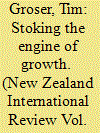

|
|
|
| 16 |
ID:
140719
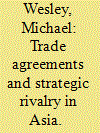

|
|
|
|
|
| Summary/Abstract |
The Asia Pacific is currently beset by two contradictory trends: growing economic interdependence and deepening strategic rivalry. Amidst these trends, new sets of regional trade agreements are being negotiated, primarily the Trans-Pacific Partnership (TPP) and the Regional Comprehensive Economic Partnership (RCEP). This article argues that these proposals represent a third phase of competitive regionalism in the Asia Pacific, which will be more complex than the previous two rounds. This complexity is driven by two factors: this time, rivalry is not over scope or leadership but regional order; and this time there is a greater number of leading players in the rivalry.
|
|
|
|
|
|
|
|
|
|
|
|
|
|
|
|
| 17 |
ID:
137897
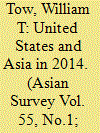

|
|
|
|
|
| Summary/Abstract |
Visible U.S. efforts to sustain influence in the Asia-Pacific met with mixed success. President Barack Obama’s visit to the region reinforced alliance commitments, but U.S. policy momentum on regional trade and diplomacy remained sluggish. Washington’s effective management of its relations with Beijing remains the key factor to how well the U.S. will fare with other regional actors and issues.
|
|
|
|
|
|
|
|
|
|
|
|
|
|
|
|